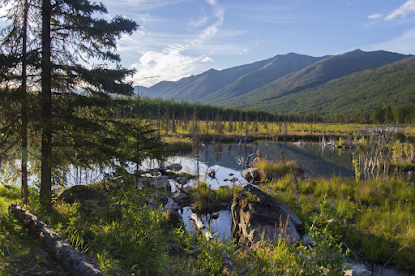Understanding Wetlands in Washington State from a Top Tacoma Real Estate Agent
If you’re considering buying property in Washington State, you’ve likely encountered the term “wetlands.” These unique ecosystems are an integral part of the state’s landscape, offering both opportunities and challenges for landowners. Whether you're envisioning your dream home or investing in raw land, understanding wetlands is essential to making informed decisions. As a top Tacoma real estate agent, my job is to help inform and educate on topics often not well understood in real estate.
What is a Wetland?
A wetland is defined as an area of land that is saturated with water, either permanently or seasonally. This water saturation creates unique soil conditions and supports vegetation adapted to wet environments. Wetlands can include marshes, swamps, bogs, and even some areas that may appear dry during parts of the year.
In Washington, wetlands are found across the state—from coastal estuaries to inland basins. They serve as a transition zone between land and water, creating a rich habitat for wildlife and acting as natural water filtration systems.
Why Are Wetlands Important?
Wetlands are vital for several reasons:
- Flood Control: Wetlands act as natural sponges, absorbing and slowing floodwaters. This reduces the impact of heavy rains and protects surrounding areas from flooding.
- Water Filtration: Wetlands filter pollutants from runoff water, improving the quality of water in nearby streams, rivers, and lakes.
- Wildlife Habitat: These ecosystems are home to a wide variety of plants and animals, including many species that are rare or endangered.
- Carbon Storage: Wetlands store carbon, helping to mitigate climate change by reducing greenhouse gas emissions.
- Aesthetic and Recreational Value: Many wetlands offer stunning natural beauty and recreational opportunities such as birdwatching, kayaking, and hiking.
Challenges and Limitations of Building Near Wetlands
While wetlands offer numerous benefits, they also come with specific challenges for property development. Whether you’re looking around Tacoma, Gig Harbor, Puyallup or Federal Way, wetlands are a fact of life. Here are some key considerations:
- Permitting Requirements: Federal, state, and local regulations often protect wetlands. Before building or altering land near a wetland, you may need permits from agencies like the U.S. Army Corps of Engineers or Washington Department of Ecology.
- Restricted Activities: Activities such as draining, filling, or clearing vegetation in a wetland are typically prohibited or heavily regulated. Even minor changes may require approval.
- Soil Stability: Wetland soils are often soft and waterlogged, making construction more challenging and expensive. You may need specialized foundations or soil stabilization techniques.
- Flood Risk: Properties near wetlands may have a higher risk of flooding, especially during heavy rain or snowmelt seasons. Flood insurance may be necessary.
- Environmental Impact: Any development near wetlands must consider its ecological impact. Mitigation measures, such as creating or restoring wetlands elsewhere, may be required.
Tips for Prospective Buyers
- Conduct a Wetland Assessment: Hire a qualified environmental consultant to determine if wetlands are present on the property and understand their boundaries.
- Review Zoning and Regulations: Research local zoning laws and wetland protection ordinances to understand what is allowed.
- Plan for Extra Costs: Be prepared for additional costs associated with permitting, specialized construction methods, or mitigation measures.
- Consider the Benefits: Instead of viewing wetlands as a limitation, consider their value as a natural feature. They can enhance property value and provide opportunities for sustainable living.
- Work with Experts: Collaborate with a knowledgeable real estate broker, environmental consultant, and builder experienced in working near wetlands.
Final Thoughts
Wetlands are a defining feature of Washington State’s diverse landscape. While they may pose challenges for property development, their ecological, aesthetic, and functional benefits are undeniable. By understanding what wetlands are and how to navigate the associated regulations, prospective homeowners and land buyers can make informed decisions and even leverage wetlands as a unique asset. If you’re relocating to Gig Harbor, I can help advise you on best practices when looking at unimproved land, or a home to build.
If you’re looking for the top agent in Gig Harbor or looking to purchase a beautiful home along the Puget Sound or Kitsap Peninsula, you can reach out to me at (206) 643-8845 or https://erikmolzen.bhhsnw.com/Contact/erikmolzen
#WashingtonStateRealEstate, #Wetlands, #PropertyDevelopment, #SustainableLiving, #EnvironmentalConservation, #LandBuyersGuide, #RealEstateTips, #FloodControl, #EcoFriendlyHomes, #WetlandPreservation, #HabitatProtection, #HomebuyersGuide, #WashingtonEcology, #LandDevelopment, #NatureConservation, #RealEstatePlanning, #WildlifeHabitat, #WetlandRegulations, #BuildingNearWetlands, #GreenRealEstate



Comments
Post a Comment